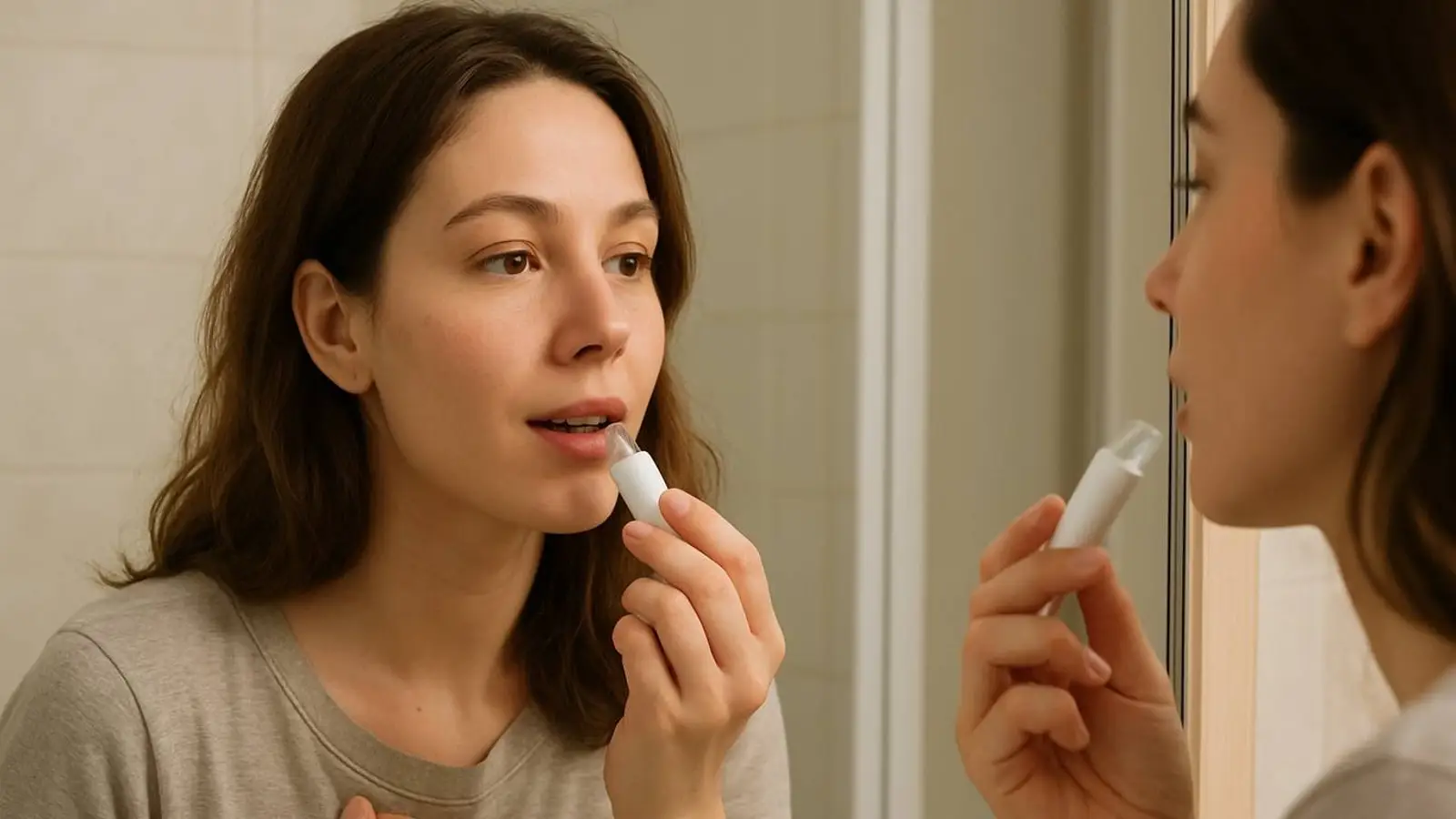https://boda.su/en/posts/id1321-dry-chapped-lips-causes-and-dermatologist-backed-fixes
Dry, chapped lips: causes and dermatologist-backed fixes
How to prevent and heal dry, chapped lips year-round
Dry, chapped lips: causes and dermatologist-backed fixes
Learn why lips get dry—sun, cold, dry air, habits, allergies—and how to fix it with the right balm, SPF, hydration, and humidity tips. Expert guide. Practical.
2025-11-26T10:34:23+03:00
2025-11-26T10:34:23+03:00
2025-11-26T10:34:23+03:00
Dry, chapped lips are a problem many people know too well. Dermatologists trace it to the skin’s structure: lips have almost no oil glands, and the skin there is very thin. That leaves them especially vulnerable to the elements—an easy detail to forget in everyday life.The main reasons your lips get drySunburn. Under ultraviolet exposure, the lips lose moisture and can become hard and brittle. People with fair skin and those over 45 should be especially careful about sun protection for their lips.Dry air and heat. In hot weather or in rooms with low humidity, lips lose moisture faster than other areas of skin.Cold. Low temperatures constrict blood vessels, reduce blood flow, and the skin dries out and cracks more easily.Habits. Licking or biting the lips speeds up drying. Mouth breathing also raises the risk of flaking.Dehydration and nutrient gaps. Not drinking enough water and deficiencies of iron or B vitamins can show up on the lips.Allergies and cosmetics. Some lip balms and lipsticks with fragrances, camphor or eucalyptus oil, menthol, and other ingredients can trigger irritation.Medical conditions. Dry lips can be a sign of eczema, allergies, thyroid problems, certain autoimmune diseases, or a side effect of medications.How to protect and restore your lipsChoose products wisely. Drop formulas with irritating ingredients. Instead, look for balms with castor oil, dimethicone, shea butter, petrolatum, and UV filters. Use your balm regularly. In hot or cold weather, apply it several times a day. For very dry lips, a thick balm or a petrolatum ointment works best. Consistency beats novelty here.Shield your lips from the sun. A balm with SPF 30 or higher helps prevent drying and UV damage.Break the habits. Don’t lick or bite your lips; try to breathe through your nose—it reduces moisture loss.Keep hydrated. Drink enough fluids so your body doesn’t go thirsty.Manage indoor humidity. During heating season, use a humidifier or other ways to keep the room comfortably humid.See a doctor if you suspect an underlying issue. If dryness comes with sores, slow healing, heightened sensitivity, or other symptoms, consult a primary care physician or a dermatologist.With the right care and a few steady habits, lips stay soft and healthy year-round. It’s a small routine with a reliable payoff.
dry lips,chapped lips,lip balm,SPF 30,petrolatum,shea butter,castor oil,dimethicone,hydration,humidifier,sunburn,cold weather,dry air,allergies,eczema,vitamin B deficiency,dermatologist tips
2025
articles
How to prevent and heal dry, chapped lips year-round
Learn why lips get dry—sun, cold, dry air, habits, allergies—and how to fix it with the right balm, SPF, hydration, and humidity tips. Expert guide. Practical.
Изображение сгенерировано нейросетью Dall-e
Dry, chapped lips are a problem many people know too well. Dermatologists trace it to the skin’s structure: lips have almost no oil glands, and the skin there is very thin. That leaves them especially vulnerable to the elements—an easy detail to forget in everyday life.
The main reasons your lips get dry
Sunburn. Under ultraviolet exposure, the lips lose moisture and can become hard and brittle. People with fair skin and those over 45 should be especially careful about sun protection for their lips.
Dry air and heat. In hot weather or in rooms with low humidity, lips lose moisture faster than other areas of skin.
Cold. Low temperatures constrict blood vessels, reduce blood flow, and the skin dries out and cracks more easily.
Habits. Licking or biting the lips speeds up drying. Mouth breathing also raises the risk of flaking.
Dehydration and nutrient gaps. Not drinking enough water and deficiencies of iron or B vitamins can show up on the lips.
Allergies and cosmetics. Some lip balms and lipsticks with fragrances, camphor or eucalyptus oil, menthol, and other ingredients can trigger irritation.
Medical conditions. Dry lips can be a sign of eczema, allergies, thyroid problems, certain autoimmune diseases, or a side effect of medications.
How to protect and restore your lips
Choose products wisely. Drop formulas with irritating ingredients. Instead, look for balms with castor oil, dimethicone, shea butter, petrolatum, and UV filters. Use your balm regularly. In hot or cold weather, apply it several times a day. For very dry lips, a thick balm or a petrolatum ointment works best. Consistency beats novelty here.
- Shield your lips from the sun. A balm with SPF 30 or higher helps prevent drying and UV damage.
- Break the habits. Don’t lick or bite your lips; try to breathe through your nose—it reduces moisture loss.
- Keep hydrated. Drink enough fluids so your body doesn’t go thirsty.
- Manage indoor humidity. During heating season, use a humidifier or other ways to keep the room comfortably humid.
- See a doctor if you suspect an underlying issue. If dryness comes with sores, slow healing, heightened sensitivity, or other symptoms, consult a primary care physician or a dermatologist.
With the right care and a few steady habits, lips stay soft and healthy year-round. It’s a small routine with a reliable payoff.

